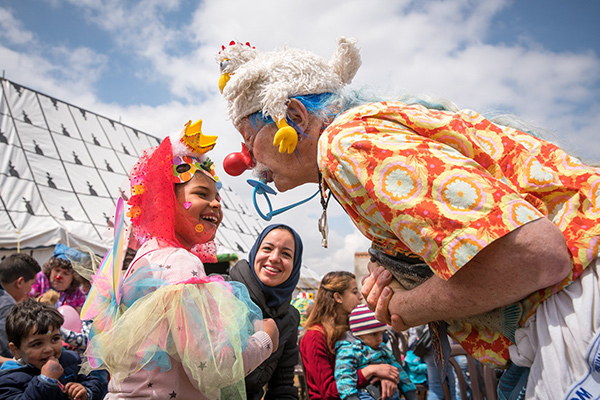Our Goal: In collaboration with local citizens, governmntal and non-governmental organizations, to improve the health, education, and living conditions of children, families and citizens of Belen currently living in extreme poverty.
Belen (spanish for Bethlehem), one of Peru’s most distressed communities, sits at the edge of Iquitos (pop 400,000), the world’s largest city unreachable by road. Lower Belen (pop. 12,000), the riverfront district in the floodplain of the Itaya River, is inundated by floodwaters from January to June each year . Residents experience many problems (lack of clean water, sanitation, adequate health care, education and employment, high rates of illness, violence, alcoholism, drug abuse and teen pregnancy).
10 years ago, Gesundheit! and Bolaroja clowns, in a meeting with Belen citizens, conceived the Belen Project, a collaborative effort to energize Belen citizens’ dreams for a healthier, happier community. From the original decision to paint every house in Lower Belen, the project has evolved to include workshops for children in art, dance and music; mural painting; community health outreach programs; parades, talent shows, and the purchase of land for the building of a community center, Belen’s first. The Belen Network now consists of a variety of organizations, (Bolaroja, Gesundheit!, Amazon Promise, La Restinga, Selva Amazonica, Pan American Health Organization, and others) whose intention is to provide Belen with support and facilitation of their desired development.
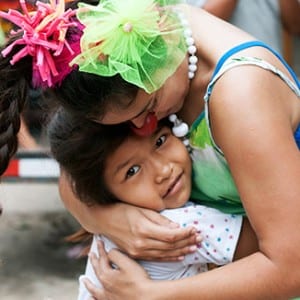
Belen Project and Festival please visit: www.belenproject.org







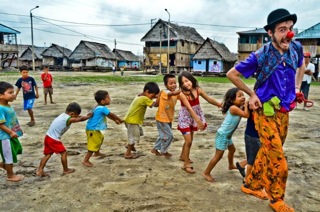 In August 2005, 30 clowns from Gesundheit! Institute (a US based non-profit organization dedicated to healthcare education and reform, and also international service and development) and Bola Roja Clown Doctors (a Peruvian hospital clown group with a focus on child advocacy), collaborated on a service mission to Iquitos, a city near the headwaters of the Amazon River. During the 2 weeks, on a visit to Belen, a profoundly poor riverside community, the plight of the residents there made a deep impression on the clowns. They decided to return to try to help in some way.
In August 2005, 30 clowns from Gesundheit! Institute (a US based non-profit organization dedicated to healthcare education and reform, and also international service and development) and Bola Roja Clown Doctors (a Peruvian hospital clown group with a focus on child advocacy), collaborated on a service mission to Iquitos, a city near the headwaters of the Amazon River. During the 2 weeks, on a visit to Belen, a profoundly poor riverside community, the plight of the residents there made a deep impression on the clowns. They decided to return to try to help in some way.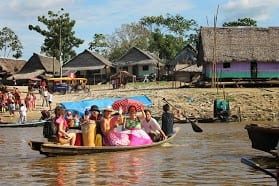 Iquitos (pop. 325,000) is the world’s largest city accessible only by air or by river. Belen (spanish for “Bethlehem”) exists at the edge of Iquitos, in the floodplain of the Itaya River (a tributary of the Amazon), and consists of 65,000 inhabitants, most of them poor, and many of whom live in extreme poverty, without electricity, none with clean water or sanitation. There also exists an estimated 60,000 people living across the river in outlying areas, also with no electricity, water and sanitation. Most homes will float or are built on stilts, as the river floods some 5-6 meters during February through July. Belen, a unique world community, has been referred to, in travel books, as the “Venice of Latin America”. In Pueblo Libre, a section of Belen on the waterfront, an estimated 14000 people, 30% under age 12, live in a busy river port, where charcoal, bananas, fish, and other goods are brought, mostly by canoe, to be distributed and sold throughout Belen. People there live in overcrowded conditions (90% of homes house 2 or more families; some homes as many as 5) and, in addition to malaria, dengue fever, water-borne illnesses, respiratory illnesses, tuberculosis, and HIV, there are problems associated with severe poverty; alcoholism, crime, prostitution, unemployment, child abuse and domestic violence. Years of deteriorating conditions in Belen have resulted in widespread frustration and hopelessness among Belen residents. Literacy is estimated at 30%.
Iquitos (pop. 325,000) is the world’s largest city accessible only by air or by river. Belen (spanish for “Bethlehem”) exists at the edge of Iquitos, in the floodplain of the Itaya River (a tributary of the Amazon), and consists of 65,000 inhabitants, most of them poor, and many of whom live in extreme poverty, without electricity, none with clean water or sanitation. There also exists an estimated 60,000 people living across the river in outlying areas, also with no electricity, water and sanitation. Most homes will float or are built on stilts, as the river floods some 5-6 meters during February through July. Belen, a unique world community, has been referred to, in travel books, as the “Venice of Latin America”. In Pueblo Libre, a section of Belen on the waterfront, an estimated 14000 people, 30% under age 12, live in a busy river port, where charcoal, bananas, fish, and other goods are brought, mostly by canoe, to be distributed and sold throughout Belen. People there live in overcrowded conditions (90% of homes house 2 or more families; some homes as many as 5) and, in addition to malaria, dengue fever, water-borne illnesses, respiratory illnesses, tuberculosis, and HIV, there are problems associated with severe poverty; alcoholism, crime, prostitution, unemployment, child abuse and domestic violence. Years of deteriorating conditions in Belen have resulted in widespread frustration and hopelessness among Belen residents. Literacy is estimated at 30%.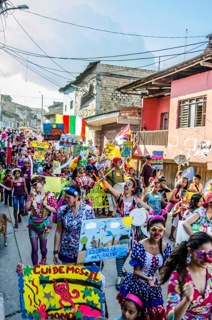 Belen Project volunteer services provide a) comprehensive healthcare to the district of Belen, Iquitos, Peru, and b) programs utilizing art, education, theater, and other modalities directed to inhabitants helping the community realize its own dreams for education, enhanced health and happiness. We also intend to develop, in collaboration with Belen Citizens, architectural and structural projects to address the water, sanitation , habitation and community space shortcomings facing Belen residents, support change through providing guidance and expertise in microeconomics and permaculture to enable the human community to direct its own development in sustainable and creative ways.
Belen Project volunteer services provide a) comprehensive healthcare to the district of Belen, Iquitos, Peru, and b) programs utilizing art, education, theater, and other modalities directed to inhabitants helping the community realize its own dreams for education, enhanced health and happiness. We also intend to develop, in collaboration with Belen Citizens, architectural and structural projects to address the water, sanitation , habitation and community space shortcomings facing Belen residents, support change through providing guidance and expertise in microeconomics and permaculture to enable the human community to direct its own development in sustainable and creative ways.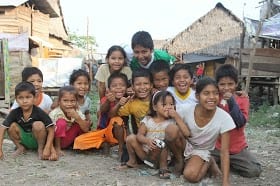 2. Human Services Develop prevention and education programs emphasizing domestic and sexual violence. Volunteer programs for children and teenagers in theater, dance, art, and craft making. Microeconomics, permaculture, libraries, sports clubs, community events. Educational scholarships for Pueblo Libre’s for poor students, a library and integrated literacy program Provide intensives for teachers and administrators to up date teaching methods.
2. Human Services Develop prevention and education programs emphasizing domestic and sexual violence. Volunteer programs for children and teenagers in theater, dance, art, and craft making. Microeconomics, permaculture, libraries, sports clubs, community events. Educational scholarships for Pueblo Libre’s for poor students, a library and integrated literacy program Provide intensives for teachers and administrators to up date teaching methods.
